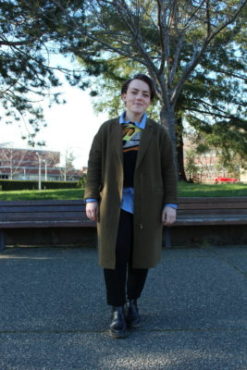Ciel Arbour-Boehme is running for Director of Campaigns and Community Relations as a Purple Party independent in the 2018 UVSS Election.

Ciel Arbour-Boehme, Purple Party, is running for Director of Campaigns and Community Relations in the 2018 UVSS elections. Photo by Angel Manguerra for the Martlet.
What are the three most important aspects of your campaign platform?
The first one is to lobby the provincial government for non-repayable needs-based grants for mid-to-low-income students. B.C. is the only province in Canada without provincial post-secondary grants, and it also carries one of the highest average student loan debts, which results in people’s stress and the lack of their ability to full-heartedly dedicate themselves to studying. I would develop the first ever provincial sexualized violence awareness week alongside other student unions. This is continuing the fantastic work of the Anti-Violence Project and Let’s Get Consensual. The third point is to hold bi-monthly events that can lead to substantive job opportunities for students. That could be networking, art events for students, a federal networking event where municipal and federal employees come and so do students who want to come, poetry reading nights, and that would link community with students. It’s reaching all of these different departments and leading to possible career paths.
What did last year’s board do well and what did they do poorly?
Last year’s board did a few incredible things. I loved Anmol’s creation of the peer resource centre and peer-to-peer mentorship. I thought that was incredible. She also created three new partners for Let’s Get Consensual around the province and participated for those three new partners in consent workshops in Vancouver. She also facilitated harm reduction workshops which just had incredible turnout and those were on campus. And also the Friendship Bench which is a beautiful metaphor. I think those elements were incredible on Anmol’s part.
I think that because the whole board was pretty homogenous and consisted of the same group of people—the same slate for the most part — I think that was kind of a failure in the arena of representation of diverse slate groups and individuals. I think that that is a huge problem, and it is a problem from last year’s UVSS board because they should inspire more people to run and participate in a politicized election because that means that more voices are heard.
What compelled you to run in this election?
In past years at UVic, I have seen fantastic students have incredible and informed opinions on themselves and others and the way the system at UVic could work to fully benefit the students as well as the faculty. And I feel as though those students don’t feel empowered at all to make the change that they desire to see. I want to participate in empowering students, facilitating accessible resources, and facilitating accessible change.
What is the biggest issue students on campus face, and how would you address it if elected?
I think the biggest issue for students right now is the insecurity about what their future looks like. Whether they are going to be able to get a job that will allow them to have a secure future, whether that be through meaningful work to them or financially. I think that that leads to stress in the moment while we are studying.
The stress of financial insecurity is a huge thing, and I want to attack that through more needs-based grants, as I previously mentioned, non-repayable [grants] and zero interest rates on student loans. And then also create a provincial tenancy act. Right now on campus there’s zero rights for student tenants, and on top of that it is so expensive and inaccessible for so many people and adding that financial burden on top of tuition and the cost of living every day is just not feasible for the majority of people.
Are you concerned about the lack of candidates in this election?
I’m very, very concerned. [11] out of the 17 positions for directors and board of directors are already filled by the same party. They did not have any competitors for those positions. I think that that means unequal representation for people. I think that also speaks to a broader problem with slates in general. It means a slate can pool together resources whereas an independent or a single person party only has their single budget. That means a lot less visibility and therefore ability to be elected.
Last year’s election saw a small voter turnout. How do you intend to raise student participation?
I believe that in order to have higher voter turnout you have to make voting accessible, which has been the case in past years but was not last year to the same extent. If people can’t access voting between classes, or easily when they are going to catch the bus if they have a tight work schedule, or have to get home to cook dinner, whatever it might be, we have to make voting accessible. That’s kind of a basic starting point. We have to have people present, be clear with where they can vote. And then you also have to inspire people through mentioning their concerns and appealing to what is in their heart.
What should the main job of the UVSS be?
The UVSS’s main job should be to listen to students’ needs and fulfil those needs and empower those students. It’s as simple as that. They should provide substantive representation, meaningful policy-oriented change.
In past elections, independent candidates and small parties have struggled to gain recognition against full slates. How do you intend to overcome this?
I think the most valuable [thing] is listening to people and looking them in the eye and letting them know you are there for them with a smile on and being honest and listening to what they need and writing down ideas. I think that’s my number one.
What do you think is important for students to know about your campaign and the upcoming elections?






